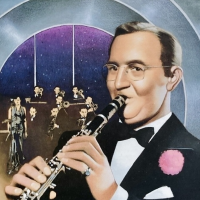Home » Jazz Musicians » Lee Wiley
Lee Wiley
Sensual and dignified, sophisticated and warm, Lee Wiley has inspired outbursts of sheer poetry from many a captivated listener. Her sound induces a "marvelous," "ticklish" sensation, akin to "running your hand over a piece of fine Harris tweed," marveled producer Dave Garroway. She "blows smoke rings, each note a puff that melts into wisps of vibrato," conceptualized author Will Friedwald. Her voice and style "have long since made me extremely eager to go to bed with her," disclosed critic James Frazier. Not content with this daring confession, he also bluntly labeled her "one bitch of a singer."
Protested singer and Wiley scholar Barbara Lea: "She had more fire, more rhythm, more roughness, more silkiness, more deep personal warmth, than the job description of Pop Singer called for." Asked writer Richard Hadlock, in an open letter to Wiley, "Lee, have you ever wondered why so many… from road-tough musicians to jaded pub-crawlers, act like kids on Christmas when they hear you sing?" (Wiley did wonder.) The eulogies could go on for pages, but the point is clear enough: Lee Wiley is a singer with a certain mystique.
The Wiley mystique was generated by both personal and professional circumstances, and further fed by some willful biographical manipulation by her musical associates, her record labels, and the artist herself. Nicknamed "Pocahontas" and characterized as regal by her friends, Wiley descended from the princess of a Cherokee tribe and from an English missionary who married an American parishioner... according to publicity material. Her birth date remains uncertain - initially given as 1915, then moved back to 1910, still more recently to 1908 - and revisionism has taken over the more sensational aspects of her biography (running away from home in the late 1920s, temporary blindness after a fall from a horse in the early 1930s, a near encounter with tuberculosis in the mid-1930s, etc,).
Her looks most certainly contributed to the Wiley allure. Her brother Ted once reported that everybody wanted to marry the tall, strikingly attractive Oklahoman with corn-colored hair and olive skin. ("Everybody" included the eight-times-married bandleader Artie Shaw, whose offer was declined by the twice-married singer.) One motivation for her long retirement (from about the age of 50 until the years preceding her death from cancer, in 1975) was the apparently high price that Wiley placed on physical attractiveness. It was her contention in 1971 that "singing includes a number of things ... aside from the voice ... these girls who are trying to get up on the bandstand at forty years old ... doesn't make any sense to me."
Read moreTags
Lee Wiley

by Carol Sloane
I was singing in the Big Room of an elegant club in New York City called The Blue Angel. One night after the show, I joined some friends in the Art Deco lounge and saw a sight I'll never forget: a woman, draped in sable, seated at one of the black leather upholstered banquettes, surrounded by five or six gentlemen in black tie. The men were clearly enchanted with this glamourous creature, lighting her cigarettes, pouring her champagne, laughing ever ...
Continue ReadingSweet And Low Down

by Mary Foster Conklin
A two hour broadcast with new releases from the legendary Louis Armstrong and His All Stars, guitarists Amanda Monaco and Doug MacDonald, a single from Terri Lyne Carrington + Social Science and vocalists Claudia Villela and Kate Vargas, with birthday shout outs to George Gershwin, Lee Wiley (pictured) and Alison Wedding, among others. Also a preview of who is currently playing around town. Playlist Anne Sajdera “New Year" from New Year (Bijuri Records) 00:00 Sarah McKenzie “It's All ...
Continue ReadingLee Wiley: Complete Fifties Studio Masters

by Craig Jolley
Like most great ballad singers Lee Wiley was grounded in the blues. Not that blues monopolized her repertoire (There is only one blues among the 51 tunes in this two-CD set.), but her blues-informed phrasing and timing gave her music a depth beyond that of the let's-cut-to-the-chase cutie pies. Combined with her cool, sensual sound and tiny vibrato (This is where Peggy Lee came from.) she was the preferred singer of many contemporary jazz musicians. By the 1950's her voice ...
Continue ReadingLee Wiley: Complete Fifties Studio Masters

by Craig Jolley
Like most great ballad singers Lee Wiley was grounded in the blues. Not that blues monopolized her repertoire (There is only one blues among the 51 tunes in this two-CD set.), but her blues-informed phrasing and timing gave her music a depth beyond that of the let's-cut-to-the-chase cutie pies. Combined with her cool, sensual sound and tiny vibrato (This is where Peggy Lee came from.) she was the preferred singer of many contemporary jazz musicians. By the 1950's her voice ...
Continue ReadingWhy Lee?: A Musical Scrapbook About Lee Wiley - The Metropolitan Room

Source:
All About Jazz
LOIS WALDEN, BARRY KLEINBORT, PAUL GREENWOOD CAPTURE THE LIFE AND LEGACY OF AN ELUSIVE SONGBIRD THE METROPOLITAN ROOM NOVEMBER 1-5, 2007 Award-winning performers Lois Walden, Barry Kleinbort, and Paul Greenwood will tell the largely untold story of acclaimed and notoriously enigmatic American singer Lee Wiley while celebrating her enduring musical legacy in WHY LEE?: A MUSICAL SCRAPBOOK ABOUT LEE WILEY during a five-night engagement at The Metropolitan Room (34 West 22nd St. between 5th ...
read more































